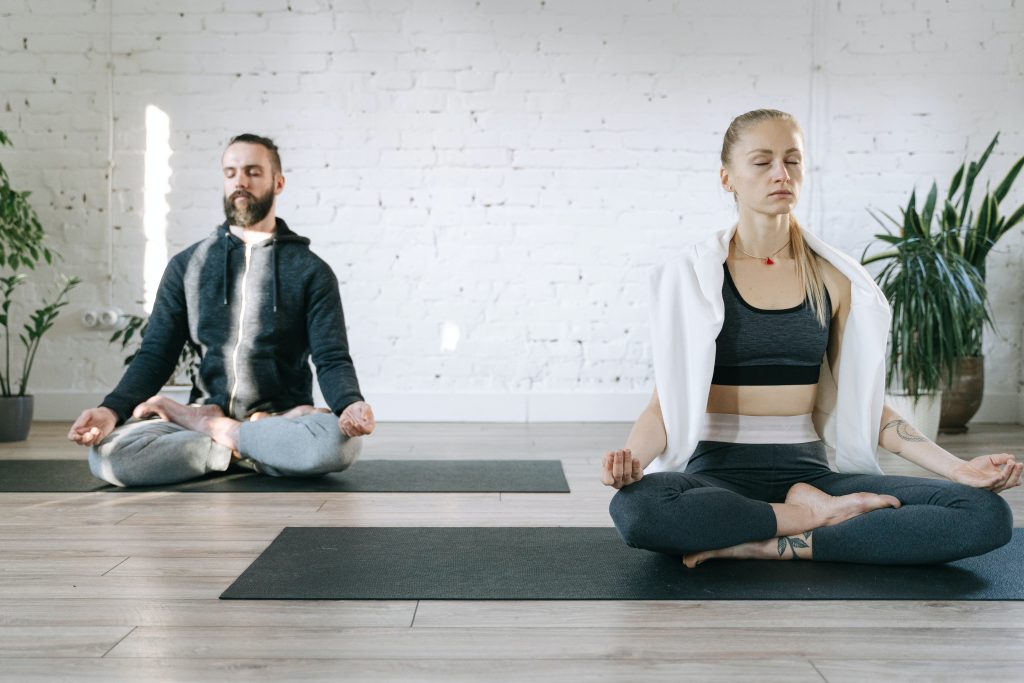Discover how meditation can be a powerful tool in managing anxiety.
Uncovering the Benefits of Meditation for Anxiety
Ah, anxiety. That nagging feeling that likes to tag along wherever we go, whispering worries in our ears and turning our mind into a tangled mess. But fear not, my friends! There is a secret weapon in the battle against anxiety, and it’s called meditation. Yes, you heard that right. The ancient practice of meditation has been found to have a powerful impact on our anxious minds, helping us find a sense of calm and balance in this chaotic world. So let’s dive right in and uncover the amazing benefits of meditation for anxiety.
Understanding Anxiety: A Brief Overview

Anxiety is more than just feeling a little nervous before a big presentation. It’s a complex web of emotions, thoughts, and physical sensations that can leave us feeling overwhelmed and unable to cope. But fear not, my friends! Understanding anxiety is the first step towards conquering it.
Let’s dive deeper into the fascinating world of anxiety and unravel its mysteries. Did you know that anxiety is a natural response that has evolved over millions of years to keep us safe? It’s true! When our ancestors encountered a dangerous situation, their bodies would release stress hormones, preparing them to fight or flee. This fight-or-flight response is deeply ingrained in our biology and is still present in our modern lives.
The Science Behind Anxiety
Anxiety is not just a figment of our imagination. It’s a biological response to stress that affects our brain and body. Our old friend, the amygdala, plays a starring role in this drama, triggering the fight-or-flight response when we perceive a threat. This small almond-shaped structure in our brain acts as our internal alarm system, constantly scanning our environment for potential dangers.
But don’t worry, meditation can help soothe our anxious amygdala and bring about a sense of calm. By practicing mindfulness and focusing on the present moment, we can train our brains to respond differently to perceived threats. Studies have shown that regular meditation can reduce anxiety symptoms and improve overall well-being.
Common Symptoms and Triggers of Anxiety
Before we can tackle anxiety head-on, it’s important to know what we’re up against. From racing thoughts to sweaty palms, anxiety can manifest itself in various ways. It’s not just a feeling of unease; it can also cause physical symptoms such as increased heart rate, shortness of breath, and muscle tension.
Let’s take a closer look at some common symptoms of anxiety:
- Excessive worrying and overthinking
- Restlessness and irritability
- Difficulty concentrating
- Trouble sleeping
- Feeling on edge or constantly alert
And let’s not forget about those pesky triggers that seem to set our anxiety off like fireworks on the Fourth of July. Triggers can be anything from specific situations or events to certain people or places. It’s important to identify our triggers so that we can develop effective coping strategies.
Together, we’ll explore these symptoms and triggers and find ways to manage them. From therapy and medication to self-care practices and lifestyle changes, there are many tools at our disposal to help us navigate the complex world of anxiety.
The Practice of Meditation: An Introduction
Now that we have a better grasp of anxiety, it’s time to introduce the hero of our story—meditation! In its simplest form, meditation is like pressing the pause button on our busy minds, allowing us to find stillness and tap into our inner peace. Get ready to embark on a journey of self-discovery and find your Zen.
But what exactly is meditation? It is not just about sitting cross-legged and chanting “om.” Meditation is a practice that has been passed down through generations, evolving and adapting to different cultures and beliefs. It is a way to quiet the noise of the outside world and connect with our inner selves.
Through meditation, we can learn to observe our thoughts and emotions without judgment. We can cultivate a sense of mindfulness, being fully present in the moment and accepting things as they are. It is a powerful tool for self-reflection and personal growth.
Different Types of Meditation
One size does not fit all when it comes to meditation. There’s a whole smorgasbord of techniques to choose from, each with its own flavor and benefits. From mindfulness meditation to loving-kindness meditation, we’ll explore the buffet of options and find the perfect practice for you.
Mindfulness meditation, for example, involves focusing our attention on the present moment, observing our thoughts and sensations without getting caught up in them. It helps us develop a greater sense of awareness and acceptance.
Loving-kindness meditation, on the other hand, is all about cultivating compassion and kindness towards ourselves and others. By repeating certain phrases or visualizing loved ones, we can tap into the power of love and spread positivity.
Other types of meditation include transcendental meditation, which involves the use of a mantra to achieve a deep state of relaxation, and guided meditation, where a teacher or recording leads us through a series of visualizations and prompts.
The Historical and Cultural Significance of Meditation
Meditation has been around for thousands of years, intertwining itself with various cultures and religions. From ancient Buddhist monks to modern-day yogis, meditation has left its mark on humanity. Join me on a journey through time as we unravel the historical and cultural significance of this transformative practice.
In ancient India, meditation was a central part of the Vedic tradition, with sages and seers seeking enlightenment through deep contemplation. It later spread to other parts of Asia, becoming an integral part of Buddhist and Taoist practices.
In the West, meditation gained popularity in the 20th century, thanks to pioneers like Swami Vivekananda and Paramahansa Yogananda who introduced it to a wider audience. Today, it has become a global phenomenon, with people from all walks of life embracing its benefits.
But meditation is not just a historical artifact or a cultural curiosity. It is a living practice that continues to evolve and adapt to our modern world. It has found its way into schools, workplaces, and even healthcare settings, as more and more people recognize its potential to reduce stress, improve focus, and enhance overall well-being.
The Intersection of Meditation and Anxiety
Now comes the exciting part—how meditation and anxiety intertwine and dance together. Brace yourself as we uncover the profound impact meditation can have on our anxious minds.
But before we delve into the depths of this fascinating relationship, let’s take a moment to understand what anxiety truly is. Anxiety, my dear readers, is not just a fleeting feeling of unease or worry. It is a complex web of emotions, thoughts, and physical sensations that can grip us tightly, making it difficult to find solace.
Now, let’s explore how meditation, with its ancient wisdom and modern scientific backing, can offer us a glimmer of hope amidst the chaos of anxiety.
How Meditation Affects the Brain
But how exactly does meditation work its magic on our anxiety-ridden brains? It’s all about rewiring those neural pathways and calming down our overactive amygdala. You see, the amygdala, often referred to as the “fear center” of the brain, plays a significant role in our anxiety response. It’s like a vigilant guard, constantly on high alert, scanning the environment for potential threats.
Through regular meditation practice, we can train our minds to become more aware of the present moment, cultivating a sense of calm and clarity. Studies have shown that meditation can actually shrink the amygdala, reducing its reactivity and allowing us to respond to stressors with greater ease.
Furthermore, meditation has been found to increase the activity in the prefrontal cortex, the part of the brain responsible for decision-making, emotional regulation, and self-awareness. This heightened activity strengthens our ability to observe our anxious thoughts and emotions without getting entangled in their grip.
So, my dear readers, by practicing meditation, we can rewire our brains, taming the anxious beast within and paving the way for a more peaceful existence.
The Role of Mindfulness in Managing Anxiety
Ah, mindfulness—a buzzword that seems to be everywhere these days. But what does it really mean? And how can it help us manage anxiety? Fear not, my friends! Let’s embark on a journey of understanding and discover the power of mindfulness.
Mindfulness, at its core, is the practice of paying attention to the present moment with intention and non-judgment. It is about fully immersing ourselves in the here and now, without getting swept away by worries about the past or future.
When it comes to anxiety, mindfulness can be a game-changer. By cultivating a mindful approach to our anxious thoughts and sensations, we can create a space of acceptance and compassion within ourselves. Instead of fighting against anxiety or trying to suppress it, we learn to embrace it with kindness and curiosity.
Through mindfulness, we develop the ability to observe our anxious thoughts and physical sensations without getting caught up in their narrative. We become skilled observers, watching the ebb and flow of our anxiety from a place of detachment.
Moreover, mindfulness practices, such as deep breathing exercises and body scans, can activate the body’s relaxation response, counteracting the physiological symptoms of anxiety. By bringing our attention to the sensations in our bodies, we can ground ourselves in the present moment, finding refuge from the whirlwind of anxious thoughts.
So, my dear readers, let us embrace the power of mindfulness as we navigate the labyrinth of anxiety, finding moments of peace and serenity amidst the storm.
The Benefits of Meditation for Anxiety
If you’ve made it this far, congratulations! We’re about to unveil the long-awaited benefits of meditation for anxiety. From reducing stress levels to boosting our focus and concentration, meditation is like a superhero cape that can transform our anxious lives.
Reduction of Stress and Anxiety Levels
Stress and anxiety are like unwelcome house guests who overstay their welcome. But thanks to meditation, we can show them the door. With regular practice, meditation has been shown to reduce our stress and anxiety levels, allowing us to live our lives with greater ease and joy.
Improvement of Focus and Concentration
Do you ever feel like your mind has a mind of its own, jumping from one thought to another like a hyperactive squirrel? Meditation can help us tame that wild mind and improve our focus and concentration. Get ready to sharpen your mental clarity and become a productivity ninja.
Enhancement of Self-Awareness and Emotional Health
In the midst of our busy lives, it’s easy to lose sight of ourselves and our emotional well-being. But fear not! Through the practice of meditation, we can deepen our self-awareness, understand our emotions more clearly, and cultivate a greater sense of compassion towards ourselves and others.
Incorporating Meditation into Your Daily Routine
By now, you’re probably convinced of the magic of meditation. But how do you actually incorporate it into your daily routine? Fear not! I’ve got you covered with some simple and practical tips to make meditation a seamless part of your everyday life.

Simple Meditation Techniques for Beginners
Don’t worry if you’re new to the world of meditation. We all have to start somewhere, right? I’ll guide you through some simple and beginner-friendly meditation techniques that will help you ease into this transformative practice.
Overcoming Common Challenges in Meditation
Let’s face it—meditation is not always rainbows and unicorns. We’ll encounter roadblocks along the way, and that’s totally normal. But fear not! Together, we’ll tackle these common challenges head-on and come out the other side with a newfound sense of resilience and inner peace.
There you have it, my friends—the journey to uncover the benefits of meditation for anxiety. It’s time to take the first step towards a calmer, more balanced life. So grab your cushion, find a quiet space, and let’s dive into the wonderful world of meditation.







